How DC decisionmaking impacts bus service cuts in the suburbs
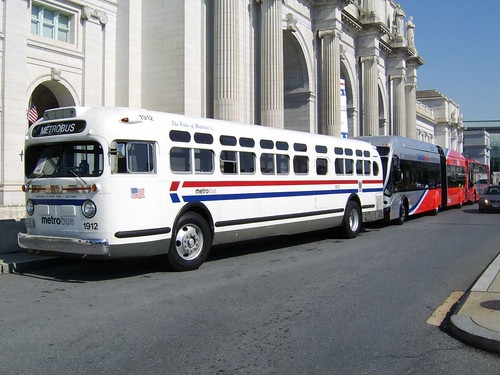
WMATA Metrobuses at Union Station for National Train Day, 2008.
I am the first to say that while I am very much concerned about regionalism, I am a chauvinist who favors the center city. That being said, DC is connected to the suburbs in so many ways that it is incumbent on all the various actors to work together. When we don't, we don't serve ourselves very well.
Yesterday's Post has a good Dr. Gridlock article on the coming bus service cuts, "Budget Cutters Target Bus Service." To be fair, the Examiner has also been providing good coverage of this issue ("Area bus riders face service cuts"), including coverage of service cuts at the county level in Alexandria ("Alexandria looks to cut bus service") and Montgomery County ("Montgomery County eyes raising bus, parking fees"). The Transit First coalition organized by the stalwart Action Committee for Transit in Montgomery County has been actively working to limit service cutbacks (see these press releases, "Apr 2, Transit First! Coalition on Metro and RideOn cuts" and "Mar 16, Transit First! on available funding to prevent RideOn cuts"). Of course, the Gazette newspapers have been covering the MoCo cutbacks as well.
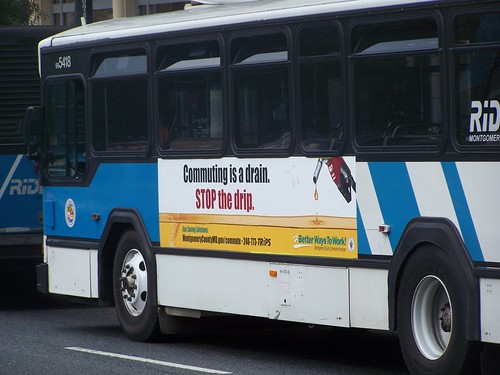
Montgomery County bus with a pro-transit advertising sign on the side.
From the Post article:
Bus service in the Washington region is about to suffer its most severe cutback in many years. The Metro board voted to hold public hearings on reducing Metrobus service to close part of the agency's $29 million budget gap. District members blocked consideration of a 5-cent across-the-board fare increase as an alternative to service cuts. Metrobus, Montgomery County's Ride On, Fairfax County's Fairfax Connector and Alexandria's DASH are among the local services planning to scale back by mid-2009 because their government sponsors are losing money. (That's tax money, not fare box money.)
In the DC region, for cost and other reasons, each jurisdiction offers separate bus service in addition to the bus services provided by WMATA as Metrobus. And each of these jurisdictions seems to have a tacit understanding that they will not charge more than the WMATA base bus fare, which is $1.25 with a SmartCard and $1.35 without a SmartCard.
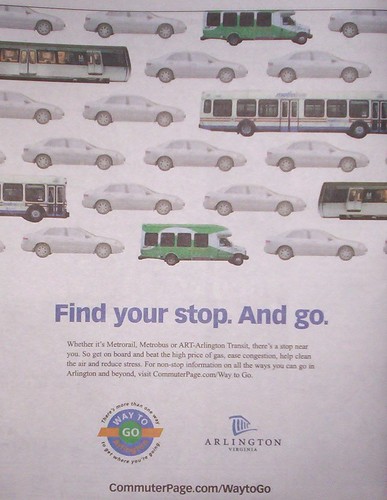
Arlington transit promotion ad from the Alexandria-Arlington Extra section of the Washington Post.
The amount of money to be saved by service cuts is about $13.5 million. Most other major cities charge $1.75 to $2.25 for a bus fare. If WMATA were to raise the fare by between 10 and 15 cents, no service would have to be cut.
This would "empower" the surrounding jurisdictions to also raise their base fares, and likely would allow these bus services to operate without big service cuts.

Fairfax Connector bus in new paint scheme in Crystal City.
This is how the DC representatives on the WMATA board's unilateral decision to oppose fare increases impacts the suburbs.
Nobody likes fare increases. But people would rather have a fare increase rather than no bus service at all.
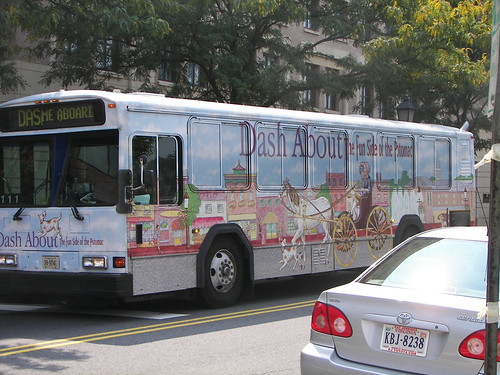
This Alexandria Dash bus is painted in a manner that promotes tourism, highlighting historic sites in the city.
In February, I wrote a blog entry on this topic, "DC needs to exhibit regional quality leadership on transit issues: and right now, maybe it isn't," but I hadn't considered the cascading defaults on service from the suburban bus operations that would result from the WMATA decision.
DC needs to demonstrate greater regional leadership on transit issues.
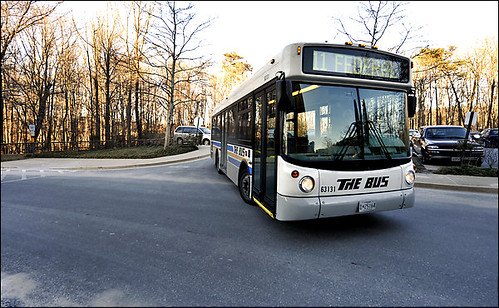
A Prince George's County bus, marketed as "The Bus," in Greenbelt. Photo Credit: By Mark Gail -- The Washington Post.
This is but one example of what not to do, and how seeming to help people by not raising bus fares has extremely negative impact on large numbers of people regardless.
Here is the schedule for WMATA hearings on bus service cuts, from the WMATA press release, "Metro sets six public hearings on proposed budget" (the press release lists the procedure for being added to the witness list):
All hearings will begin at 6:30 p.m. The hearing dates and locations are as follows:
• Monday, April 13, at First United Methodist Church, Fellowship Hall, 6201 Belcrest Road, in Hyattsville, Md. (hearing number 538)
• Monday, April 13, at Marshall Road Elementary School Cafeteria, 730 Marshall Road SW, in Vienna, Va. (hearing number 539)
• Tuesday, April 14, at First Baptist Church of Wheaton, 10914 Georgia Ave. in Wheaton, Md. (hearing number 540)
• Wednesday, April 15, at Arlington County Government, 2100 Clarendon Boulevard, County Board Room, 3rd Floor, in Arlington, Va. (hearing number 541)
• Wednesday, April 15, at St. Francis Xavier Church, Bailey Room, 2800 Pennsylvania Ave., SE, in Washington, D.C. (hearing number 542)
• Friday, April 17, at Metro Headquarters, 600 Fifth St., NW, in Washington, D.C. (hearing number 543)
I have never testified at a WMATA hearing. I guess this round will be my first.

Photo of a City of Falls Church George bus by Adam Moreira via Wikipedia.
Labels: transit economics, transit fares, transit funding, transportation planning, urban vs. suburban



0 Comments:
Post a Comment
<< Home